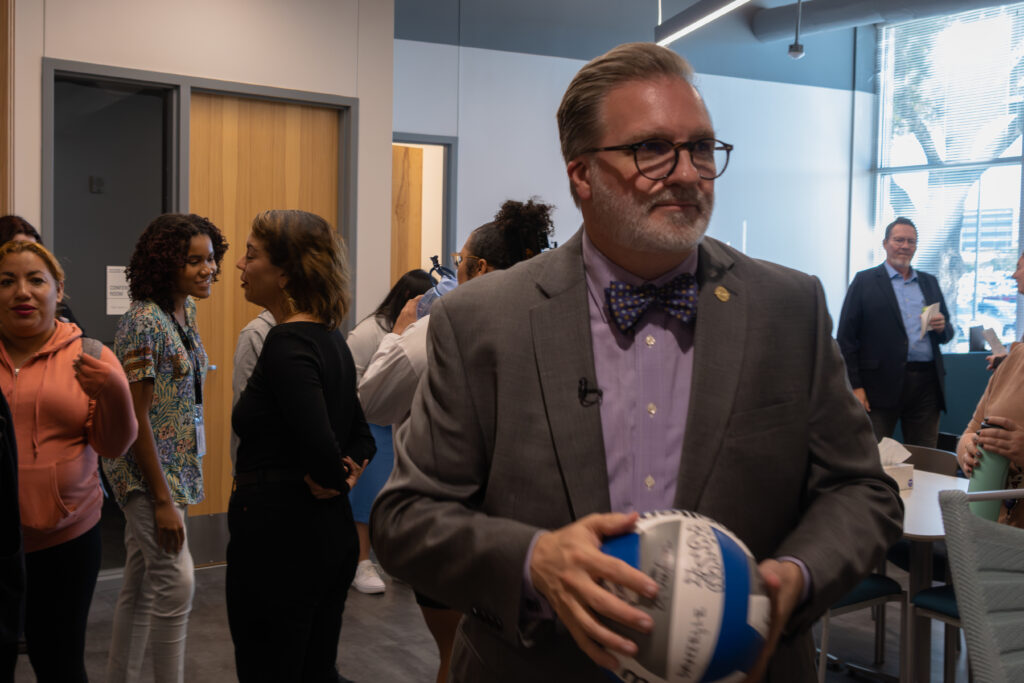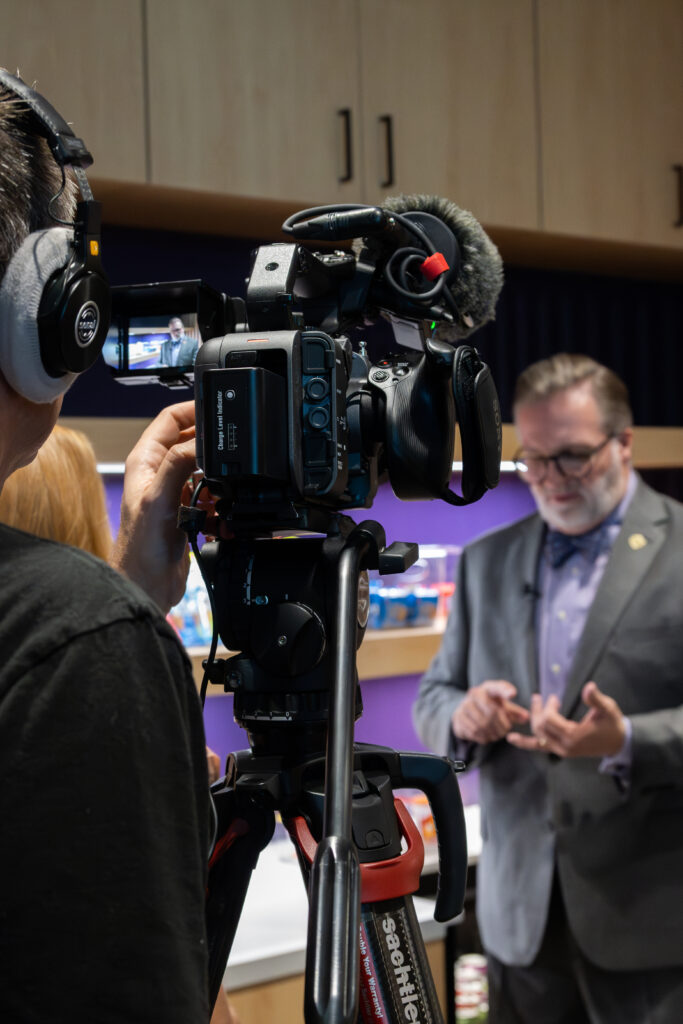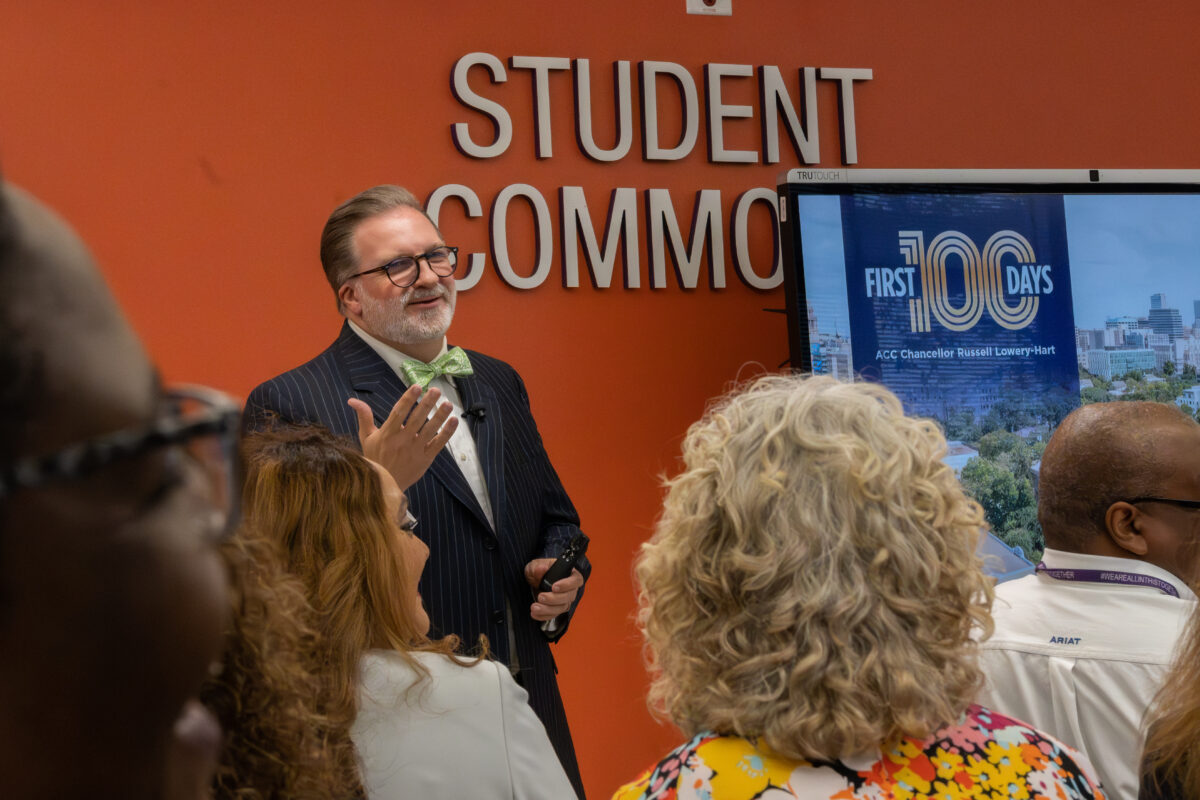An interview with the new Chancellor of ACC, Russell Lowery-Hart about his past career and upcoming plans as head of the college.
By Josie Hurt
Photos by Nathan Adam Spear
This article was featured in the Fall 2023 issue of ACCENT Magazine
On a cold and wet night, Dr. Russell Lowery-Hart was sleeping on the streets of Waco, quietly crying. He was reflecting on how the next morning his life would pretty much go back to normal. It was the second night that Lowery-Hart attempted to simulate living homeless in order to understand what students who experience poverty go through. He says this was a transformative experience for him.
Reflecting on what happened he says, “The feeling of isolation was overwhelming, but what hit me even harder was the devastation I felt knowing this simulation is a reality for too many people.” This unconventional approach towards understanding the student experience is what defines the new Chancellor’s leadership style.
When ACC’s previous Chancellor, Richard Rhodes, announced his retirement in January of this year, the board of trustees began an extensive nationwide hunt for someone to fill his shoes. The months-long search concluded when the board unanimously approved Lowery-Hart as the next Chancellor of ACC.
So what is a chancellor anyways? For those of you who don’t know – a chancellor is essentially the academic leader at institutions of higher education. It is basically the Mayor, CEO, or President of the College who oversees the entirety of the ACC’s service district – which means 7000 square miles, several cities, and 11 campuses. The chancellor formulates the plans and programs of the school as well as directs all of the administrative responsibilities. The Chancellor operates under ACC’s board of trustees, who represent the residents of ACC’s tax district. They establish policies and provide guidance and leadership to meet the community’s needs. Basically, voters in an ACC service district elect the board who in turn hire the chancellor to carry out the day to day operations of the school.
Lowery-Hart is no newcomer to the higher education system. Russell, as he prefers to be called, served as the president of Amarillo College for nearly a decade. Before that he was Vice President of Academic Affairs at Amarillo. With him in charge, Amarillo College won the 2023 Aspen Prize; a prestigious award for community college excellence.
Guided by his new understanding of student homelessness, Russell met one on one with students in his community to better understand their needs. He says his “loving systems of support” helped Amarillo students meet basic needs like free transportation, food pantries, low cost daycare, and even free dental care. According to Russell, “the only way to make education possible for more people: help eliminate barriers and literally love them to success.”.
Russell is a native Texan and grew up on a farm in a small town outside Lubbock. “Most people are surprised I wore boots and wranglers all the way until my freshman year of college”. After highschool, Russell started his lifelong journey with higher education. In an interview with the Amarillo Economic Development Corporation he says, “I went to West Texas A&M for my undergrad and really felt like I found my personal voice. College was a place where I realized I could be who I was and could define what that meant.” He graduated from West Texas University with a B.S. in Communications and continued his education with a master’s degree from Texas Tech followed by a doctorate’s from Ohio University.
In order to help ACC students understand what Russell does, and his future plans, ACCENT reached out for questions from the student body. In our recent conversation, Russell was able to answer some of the concerns as well as share his plans and aspirations for the college. In the following interview, Russell shares his wisdom and a glimpse into his early plans for ACC’s future.

Hurt – It seems that a lot of students don’t really know what a chancellor does, in your own words how would you describe what you do?
Lowery-Hart – I think more than anything the chancellor sets the vision and the path and then puts processes in place to ensure that we can build those paths with the student voice at its center and then once we do that, we hold our college accountable.
What are the most important issues that you hope to address here at ACC?
The issues that I worry about at ACC aren’t uncommon to the issues that we see across the country. I especially worry in this community about the wealth gap and how that’s directly affecting our students. The student’s journey to ACC is so critically important, not just to their lives but to the lives of our community, our region, and the country. I want ACC to provide skills and credentials and degrees, and transfer pathways that lead to success for our students so that we build ourselves around what the student tells us they need from us.
I’m curious how this differs from a lot of the issues going on in Amarillo College?
I think one is the size and the scope of this community. The workforce needs and the workforce opportunities are dramatically different. This is a tech economy, it’s in an urban setting that has a lot of resources and opportunities, but it also has a really challenging cost of living and wealth gap. Those things are really different from where I came from.
Do you think you are going to have any challenges adjusting?
So, I have worried about that since the first few weeks I have been here, and even in the two weeks before I moved to Austin and met people.The campus is much bigger but students have the same needs; they are the same group of magical voices that we build ourselves around. I’ve met colleagues here that are really committed to doing what it takes to love our students to success and so I’m more excited and comfortable today than I was on the first day. I’m not going to lie; on day one, I was scared. I walked to work and was like, “it’s a big place and we have campuses all over the region”. I wanted to make sure that I could honor all parts of the district: the students, the employees and the community. It’s a big task, but what I learned is that the talent that exists here, the commitment, the team approach meant that it wasn’t anything that I should have been worried about.
Where were you when you first found out that you were going to be chancellor? What was going on?
That’s a great question. I was in the middle of teaching a class at Stanford University in California and my phone kept blowing up in my pocket because people were texting and notifying me. So in a break I got notified that the board had voted to approve me. Then I immediately started working with my friends in communication to craft messages and connect with the community in an authentic way.
Obviously Dr. Richard Rhodes has left quite the legacy here in his 12-year tenure, in what ways do you plan to pick up where he left off or maybe differ?
Yeah, he has. I talked to Richard this morning and you know it’s the start of my third week and my first board meeting. I just thanked him for the legacy that he’s created – for the resources, community partnerships, and community trust and support. Because those things are incredible and speak to the power of this institution. We’ll continue to honor those external partnerships and be innovative in responding to workforce needs, but my focus will be – at least in the first year – internally focused on our students and employees ensuring that we build systems that we all honor.
More specifically, do you have any projects in mind that you’re planning on working on in the first year?
Well I think that’s what I’m trying to discover in the first 100 days, by going to every campus meeting our faculty, staff, and students. Trying to understand what is working really well so we can scale it and know where our opportunities are, our challenges are, so that we can address them. I’m already seeing issues across the district with ensuring that every campus feels seen and included and that our systems allow for ease in accessing things like books and the equipment and tools that they need. Those are things that we’ll continue to work on but I don’t plan on making any changes or decisions in the first 100 days because I want to honor the process and honor what’s already been here and I don’t want to bring my own history or my own potential biases to that process yet.
Looking past the first year and into the next couple years, what is your vision for ACC?
That it will be a place that will have doubled our graduation rate, maybe tripled our completion rate. That we built systems that love our students and our employees to success, both inside the classroom and outside.
How do you think your previous experience at Amarillo College will inform the decisions you make here?
The work at Amarillo College that I engaged in around poverty and accelerated learning received a lot of national attention and won the Aspen Prize as the top college in the country. Those are important experiences that I bring with me to this role but I’m also committed to knowing that that path need not be reflected in this one. That’s what I wanted to spend the 100 days doing, ensuring that the skills and experience I bring match what the district needs, not super-imposing my past on the future of this institution. It can inform the way I lead and the questions I ask but our path needs to be ours and not someone else’s.
I’m sure you’ve been keeping an eye on Texas politics going on and there’s a lot of stuff that’s affecting education. Are there any things specifically that you’re worried about in the near future?
I don’t understand the need for the politics around Senate Bill 17. It’s outlawing DEI offices. The law doesn’t make sense to me. I don’t understand the need for the law, but it’s not my job now it’s passed to question it. My job is to ensure that we build systems and experiences that honor all of our students and that we can build belonging and compassion and care and connection into everything we do. So we’ll still work on issues on inclusivity and diversity and we’ll still honor all of our students’ journeys to us. But I don’t care what we call it. I just care that we become a place where every student can have their own success story with the resources and support they need from faculty and staff who know and understand them and have the resources they need to love them.

What role do you feel like a community college plays in the community?
That’s a great question. I spent the majority of my career in universities and I left the university world and came to a community college world because I felt like higher education in universities were choking themselves in traditions that weren’t built on who our students are. They were built on who they wished their students were or who they were when they were students or who our students were historically; and community colleges were a space that was nimble, innovative, and courageous. When you look at the transitions that our communities are needing to take, not just in this region but across the country and you look at the challenges in the wealth gap and poverty, you’ll see that universities are not positioned to solve those issues and community colleges are. Austin Community College in particular has the talent and the resources and support to truly be the institution that can redefine how higher education works.
This is a very forward question. Richard Rhodes was here for 12 years, a record breaking amount of time, how long do you plan on staying at ACC?
I hope to finish my career here and I can officially retire in 11 years and I would hope that in 11 years we’re having a conversation of celebrating the legacy that we built here that’s not specific to me but is a legacy that’s honoring our students and our community.
House Bill eight is something that is going to change ACC’s funding from enrollment based to performance based. How do you plan to make sure that ACC is ready for this policy?
I am really excited by the House Bill eight changes, but it will call us to transform in ways that we have not before. Because we are in a population center it’s easy to fall into the trap of enrollment based funding. Now we have to get great at outcomes, which is why we need to double our graduation rate and triple our completion rate. We need to build systems that can ensure our students can finish what they start and House Bill eight incentives us to do that. It will give us the resources to – if we can do it correctly – to pay more and to have the kind of tools and technologies and support systems that our student and faculty and staff need.
What role does student collaboration have in your leadership style as chancellor?
It is the foundation of our leadership style. I use secret shoppers a lot and I’ve already engaged some secret shoppers just to help me understand how students are receiving us as a district and how they navigate our processes and I intend to elevate those student voices in helping us reimagine our values and ensuring that our strategic plan clearly articulates how the student voice gives us the path forward.
There’s also the loan moratorium that recently ended. How do you feel like this will affect community college students?
I worry about it because I think that our community college students could be the most impacted.
The good thing is that if you’re enrolled in classes with us you’re exempt and so let’s make sure our students are in pathways to a high wage job that can make loan repayments easy, but I think that in our community, not just in the region but in the country too, that it will impact our economy because right now that loan moratorium allowed students to pay rent or to buy clothes for their kids going to school in the fall maybe to buy a used car and now those things will not be deployed in the economy they’ll be paying back a loan. I worry about that.
This is the last question. Are there ways students can reach you easily and what kind of issues are you willing to work with them on?
I’m willing to work with students on anything. If you go to the chancellor’s website there’s an opportunity to comment. We watch that everyday so if a student has a comment, I’ll see it before the end of the day. The other option that we’re going to have is student town halls every semester just with me. It’ll be virtual where they can log in and they can tell me what they want and, if they really need to see or connect with me, they can call my office and I’ll always prioritize what a student needs over what my own professional needs are.


